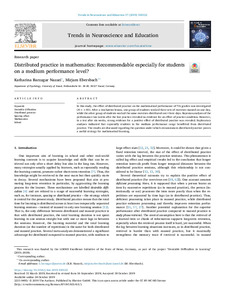Datum
2019-10-24Metadata
Zur Langanzeige
Aufsatz

Distributed practice in mathematics: Recommendable especially for students on a medium performance level?
Zusammenfassung
In this study, the effect of distributed practice on the mathematical performance of 7th graders was investigated (N == 81). After a stochastics lesson, one group of students worked three sets of exercises massed on one day, while the other group of students worked the same exercises distributed over three days. Bayesian analyses of the performance two weeks after the last practice revealed no evidence for an effect of practice condition. However, in a test after six weeks, strong evidence for a positive effect of distributed practice was revealed. Exploratory analyses indicated that especially students in the medium performance range benefitted from distributed practice. The results are discussed regarding the question under which circumstances distributed practice proves a useful strategy for mathematical learning.
Zitierform
In: Trends in Neuroscience and Education Volume 17 (2019-10-24) eissn:2211-9493Förderhinweis
This research was funded by the LOEWE Excellence Initiative of the State of Hesse, Germany, as part of the project “Desirable Difficulties in Learning” (2015–2018)Zitieren
@article{doi:10.17170/kobra-202103253597,
author={Barzagar Nazari, Katharina and Ebersbach, Mirjam},
title={Distributed practice in mathematics: Recommendable especially for students on a medium performance level?},
journal={Trends in Neuroscience and Education},
year={2019}
}
0500 Oax
0501 Text $btxt$2rdacontent
0502 Computermedien $bc$2rdacarrier
1100 2019$n2019
1500 1/eng
2050 ##0##http://hdl.handle.net/123456789/13071
3000 Barzagar Nazari, Katharina
3010 Ebersbach, Mirjam
4000 Distributed practice in mathematics: Recommendable especially for students on a medium performance level? / Barzagar Nazari, Katharina
4030
4060 Online-Ressource
4085 ##0##=u http://nbn-resolving.de/http://hdl.handle.net/123456789/13071=x R
4204 \$dAufsatz
4170
5550 {{Mathematikunterricht}}
5550 {{Lerntechnik}}
5550 {{Experimentelle Psychologie}}
7136 ##0##http://hdl.handle.net/123456789/13071
<resource xsi:schemaLocation="http://datacite.org/schema/kernel-2.2 http://schema.datacite.org/meta/kernel-2.2/metadata.xsd"> 2021-08-03T16:21:15Z 2021-08-03T16:21:15Z 2019-10-24 doi:10.17170/kobra-202103253597 http://hdl.handle.net/123456789/13071 This research was funded by the LOEWE Excellence Initiative of the State of Hesse, Germany, as part of the project “Desirable Difficulties in Learning” (2015–2018) eng Attribution-NonCommercial-NoDerivatives 4.0 International http://creativecommons.org/licenses/by-nc-nd/4.0/ desirable difficulties distributed practice spacing effect mathematics school 150 Distributed practice in mathematics: Recommendable especially for students on a medium performance level? Aufsatz In this study, the effect of distributed practice on the mathematical performance of 7th graders was investigated (N == 81). After a stochastics lesson, one group of students worked three sets of exercises massed on one day, while the other group of students worked the same exercises distributed over three days. Bayesian analyses of the performance two weeks after the last practice revealed no evidence for an effect of practice condition. However, in a test after six weeks, strong evidence for a positive effect of distributed practice was revealed. Exploratory analyses indicated that especially students in the medium performance range benefitted from distributed practice. The results are discussed regarding the question under which circumstances distributed practice proves a useful strategy for mathematical learning. open access Barzagar Nazari, Katharina Ebersbach, Mirjam doi:10.1016/j.tine.2019.100122 Mathematikunterricht Lerntechnik Experimentelle Psychologie publishedVersion eissn:2211-9493 issn:2452-0837 Trends in Neuroscience and Education Volume 17 false 100122 </resource>
Die folgenden Lizenzbestimmungen sind mit dieser Ressource verbunden:


